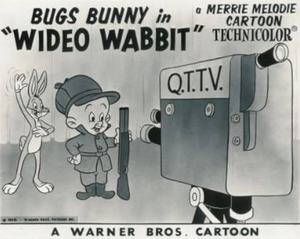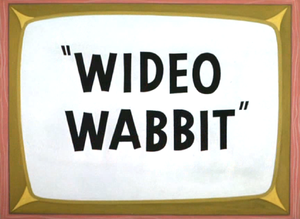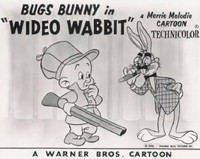Wideo Wabbit
| Wideo Wabbit | |
|---|---|
 Lobby card. | |
| Production company | Warner Bros. Cartoons |
| Distributor | Warner Bros. Pictures The Vitaphone Corporation |
| Release date | October 27, 1956 |
| Starring | Mel Blanc Arthur Q. Bryan Daws Butler |
| Producer(s) | Edward Selzer |
| Music composition | Carl Stalling |
| Story | Tedd Pierce |
| Animation | George Grandpré Keith Darling Ted Bonnicksen Russ Dyson |
| Director(s) | Robert McKimson |
| Series navigation | |
| ← Previous | Next → |
| Title card | |

| |
Wideo Wabbit is the four hundred and seventeenth Merrie Melodies theatrical short. It was distributed by Warner Bros. Pictures and The Vitaphone Corporation on October 27, 1956. It was written by Tedd Pierce, produced by Edward Selzer, and directed by Robert McKimson.
When Bugs learns that a television station is in need, he doesn't realize that the role is solely for Elmer's TV show, where he goes hunting for wabbits.
Detailed summary
Memorable quotes
Bugs: Geeze, what a Groucho. Va-va-va-voom!
Characters
In order of appearance: | ||||||||||
| ||||||||||
Organizations
Locations
- Earth
- United States
- Forest
- QTTV TV station
- Washington (mentioned)
- Walla Walla (mentioned)
- United States
Objects
- Newspaper
- Ladder
- 10,000 volt battery
- Piano
- Dynamited candelabra
- Groucho disguise
- Norton Disguise
Production

Development
Filming
Music
The music was composed by Carl Stalling. This was the last time that the theme, "What's Up Doc?" was used for the title sequence. Beginning with To Hare Is Human, all Bugs Bunny cartoons would use different title themes.
Additionally, a unnamed music cue from A Wild Hare is used when Elmer follows "wabbit twacks".
Release
Dates are in order of release:
- United States: October 27, 1956 in theatres
Behind the scenes
- The title is a play on "Video Rabbit," only the V and R's are replaced with W's to match with Elmer's speech patterns.
- The working title was "Omni Bunny", which is likely a pun on "omni man." Not to be confused with the Invincible character, though.
- This short updates Bugs' design on the Bugs Bunny introductory card for the first time since Hare Trigger, which would be used up to False Hare in 1964.
- When Bugs impersonated the voices of both Groucho Marx and later Ed Norton from The Honeymooners in two scenes, Mel Blanc did not provide the voices in those two sequences; Daws Butler instead provided those voices.
- Blanc admittedly found himself to be terrible at celebrity voice impersonations, despite the fact that his voices for Pepé Le Pew and Foghorn Leghorn were based on actual actors.
- Additionally, this is the second instance where Bugs played Groucho Marx to avoid Elmer. The first time was Friz Freleng's cartoon Slick Hare, but Elmer comes much closer to catching Bugs in that Groucho scene than in the one in Wideo Wabbit, by means of disguise as Groucho's brother Harpo.
- The animation of Bugs as Liberace playing Hungarian Rhapsody No. 2 on the piano, and getting his fingers tied in a knot is reused from Rhapsody Rabbit. Coincidentally, Tedd Pierce wrote that cartoon alongside Michael Maltese.
Legacy
- Station QTTV would be seen again in two more shorts: The 1959 Merrie Melodies short People are Bunny, and the 1963 Looney Tunes short The Million Hare.
- People are Bunny would also reuse some elements from this short, but with Daffy Duck taking place of Elmer.
- This short was used in the television special Bugs Bunny's Mad World of Television.
Critical reception
In other languages
| Language | Name | Meaning |
|---|---|---|
Home availability
- In the United States: